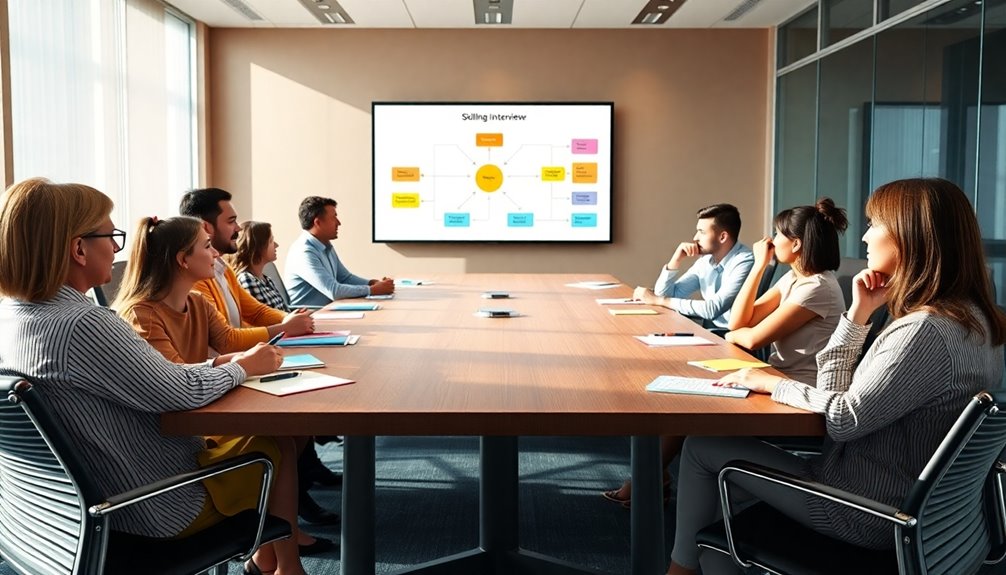Mastering skills-based interviews is all about asking the right questions to reveal a candidate's real-world abilities. You'll want to focus on adaptability, communication skills, and decision-making strategies. Ask candidates how they've handled unexpected changes or challenges, and look for examples showcasing their critical thinking. Evaluate their interpersonal skills through questions about teamwork and conflict resolution. This approach not only highlights their hard and soft skills but also uncovers their potential fit for your organization. If you're curious about specific questions that can disclose these skills, there's plenty more to explore.
Key Takeaways
- Focus on both hard and soft skills to assess overall workplace fit during the interview.
- Utilize the STAR method to effectively showcase your decision-making experiences.
- Prepare to discuss adaptability by sharing specific examples of overcoming unexpected challenges.
- Emphasize communication skills through examples of successful teamwork and conflict resolution.
- Highlight interpersonal skills by demonstrating active listening and empathy in past situations.
Skills-Based Interview Overview

Skills-based interviews frequently focus on uncovering your workplace proficiencies, setting them apart from traditional competency-based interviews.
These interviews aim to assess both your hard and soft skills, giving employers insight into how you'll fit within their team. Unlike competency-based interviews, which often emphasize general experiences, skills-based interviews dive deeper into your specific abilities and traits.
They highlight your self-awareness and integrity, showcasing how you approach challenges and collaborate with others. You can expect questions that reveal your problem-solving methods and interpersonal dynamics, emphasizing the importance of your unique contributions to the workplace.
Importance of Adaptability

In today's fast-paced work environment, adaptability is an essential skill that can greatly impact your success. Being adaptable means you're willing to adjust to new projects and changing expectations, which shows your productivity capabilities.
It's vital for managing last-minute tasks efficiently and thriving in dynamic settings. When you embrace adaptability, you demonstrate quick thinking and problem-solving skills, making you a valuable asset on any team.
This skill also emphasizes continuous learning and growth, allowing you to navigate challenges effectively. By showcasing your adaptability during interviews, you highlight your resilience and readiness to face unexpected obstacles, which can set you apart from other candidates and position you for long-term success in your career. Additionally, leveraging personalized learning pathways can enhance your adaptability by aligning your skills with evolving job demands.
Communication Skills Assessment

Effective communication serves as the backbone of successful teamwork and collaboration in any workplace. To assess your communication skills during interviews, be prepared to showcase both verbal and non-verbal abilities. You'll need to demonstrate how clear communication fosters understanding and streamlines processes. Consider these key areas:
| Communication Type | Importance | Example Scenario |
|---|---|---|
| Verbal | Clarity in sharing ideas | Leading a team meeting |
| Non-Verbal | Enhancing message delivery | Using body language in presentations |
| Written | Documenting processes | Creating clear project reports |
Incorporating natural language processing techniques can further enhance your communication effectiveness by enabling more personalized interactions.
Decision-Making Capabilities

Decision-making capabilities play an essential role in shaping successful outcomes in any organization. When you face challenges, your ability to analyze situations and evaluate options is vital.
You'll need to demonstrate critical thinking by weighing benefits against potential risks. In interviews, expect questions that assess how you approach difficult choices, such as budget allocation or strategic planning.
Use the STAR method to highlight specific examples from your past, focusing on your thought process and the outcomes of your decisions. Reflect on what you learned and how those experiences shaped your decision-making style.
This not only shows your analytical skills but also your growth mindset, making you a valuable asset to any team.
Interpersonal Skills Evaluation

Interpersonal skills are essential for fostering positive relationships and collaboration in the workplace. During interviews, you'll need to demonstrate your ability to connect with others, resolve conflicts, and communicate effectively. Here's a quick overview of key interpersonal skills to highlight:
| Skill | Description |
|---|---|
| Active Listening | Fully concentrating on what others say. |
| Empathy | Understanding and sharing feelings of others. |
| Conflict Resolution | Addressing disagreements constructively. |
| Team Collaboration | Working effectively within a group. |
| Feedback Reception | Accepting and integrating constructive criticism. |
When asked about your interpersonal skills, reflect on your strengths and any areas for improvement, showing how you've worked to enhance these skills over time.
Customer Service Essentials

Customer service is the backbone of any successful business, especially when it comes to direct interactions with clients. You need to demonstrate effective communication skills, showing empathy and understanding while addressing customer needs.
Active listening is essential; it allows you to grasp concerns and provide tailored solutions. When faced with product requests, apologizing for shortcomings and offering alternatives can turn a negative experience into a positive one.
Remember, respecting a customer's time and encouraging feedback fosters loyalty. Adapt your approach based on individual experiences, ensuring customers feel valued.
Ultimately, your ability to support and guide clients greatly influences the overall satisfaction and reputation of your company, making these skills indispensable in any customer-facing role.
Professional Development Focus

Continuous growth is essential for success in today's ever-evolving workplace. By committing to professional development, you enhance your skills and adapt to new challenges.
Seek opportunities like workshops, online courses, and mentorship programs to expand your knowledge. Regularly ask for feedback from peers and supervisors; this insight helps identify areas for improvement.
Networking can also play a significant role—connecting with industry professionals exposes you to new ideas and practices. Remember, staying updated on industry trends not only boosts your confidence but also makes you a valuable asset to any team. Additionally, adopting an MVP (Minimum Viable Product) approach allows you to test your skills in real-world scenarios and refine them based on feedback.
Embrace a mindset of lifelong learning, and you'll position yourself for ongoing success in your career. Prioritize your growth, and watch your professional path flourish.
Time Management Strategies

Effective time management is a key component of professional development that can greatly impact your productivity and success.
To enhance your time management skills, consider these strategies:
- Prioritize Tasks: Use the Eisenhower Matrix to distinguish between what's urgent and important, helping you focus on high-impact activities.
- Set Specific Goals: Break larger projects into smaller, achievable goals with clear deadlines to maintain momentum.
- Utilize Tools: Leverage calendars, to-do lists, and project management software to keep track of your tasks and deadlines.
- Review and Adjust: Regularly assess your progress and be flexible in adjusting your plans to accommodate unexpected changes.
Frequently Asked Questions
How Do I Prepare for a Skills-Based Interview?
To prepare for a skills-based interview, start by identifying your relevant hard and soft skills.
Review common interview questions, like those about adaptability or decision-making, and practice your responses using the STAR method. Think of specific examples from your past experiences that demonstrate your abilities.
Additionally, research the company's culture to align your answers with their values.
Don't forget to prepare questions for the interviewer to show your genuine interest.
What Types of Roles Benefit Most From Skills-Based Interviews?
Oh sure, because who wouldn't want a role that's just a delightful guessing game?
But seriously, roles in customer service, project management, and tech thrive in skills-based interviews. These positions demand adaptability, communication, and decision-making skills—qualities you can showcase through real experiences.
If you can juggle tasks like a circus performer while charming clients, you'll shine.
How Can I Showcase Soft Skills During the Interview?
To showcase your soft skills during the interview, share specific examples that highlight your adaptability, communication, and interpersonal abilities.
Use the STAR method to structure your responses, focusing on situations where you navigated challenges or collaborated effectively with others.
Be confident and articulate your thought process clearly.
Engaging with the interviewer through active listening and maintaining eye contact also demonstrates your strong communication skills, creating a positive impression throughout the conversation.
What Should I Wear to a Skills-Based Interview?
Did you know that 55% of first impressions come from appearance? For a skills-based interview, you should aim for a polished, professional look.
Opt for business casual attire—think tailored trousers and a smart shirt. Avoid overly flashy accessories, but make certain your clothes are clean and well-fitted.
How Can I Follow up After a Skills-Based Interview?
After a skills-based interview, you should follow up with a thank-you email within 24 hours.
Express your appreciation for the opportunity, mention something specific from the interview, and reiterate your enthusiasm for the position.
Keep it concise and professional.
If you haven't heard back in a week or two, it's perfectly fine to send a brief inquiry about your application status.
This shows your continued interest and initiative.
Conclusion
So, you've mastered the art of skills-based interviews—congratulations! You're now equipped to dazzle your future employer with your "superhuman" adaptability and communication prowess. Who knew highlighting your knack for teamwork and decision-making could be as thrilling as a rollercoaster ride? Just remember, while you're busy showcasing your perfect blend of hard and soft skills, don't forget to breathe—after all, you wouldn't want to turn your interview into an Olympic event! Good luck out there!
Eugene brings a fresh, dynamic voice to our platform as one of our talented Writers. Specializing in research-driven content, he explores the latest findings in psychology and personal growth, translating them into actionable insights for our readers. Eugene’s work is fueled by a curiosity about what makes us tick and a desire to help others unlock their potential.










